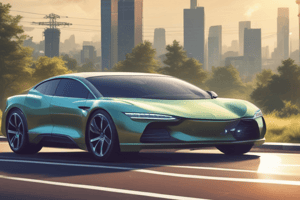Podcast
Questions and Answers
What is the primary function of an electric motor in a traditional hybrid car?
What is the primary function of an electric motor in a traditional hybrid car?
- To power the vehicle for a short distance
- To charge the battery
- To replace the internal combustion engine
- To support the internal combustion engine to stretch each gallon of fuel further (correct)
What is a characteristic of plug-in hybrid electric vehicles (PHEVs)?
What is a characteristic of plug-in hybrid electric vehicles (PHEVs)?
- They require a power source to charge (correct)
- They do not have an internal combustion engine
- They use only gasoline for fuel
- They do not require a power source to charge
What happens when the electric motor in a plug-in hybrid car drops below a specific charge?
What happens when the electric motor in a plug-in hybrid car drops below a specific charge?
- The gasoline engine takes over (correct)
- The electric motor is recharged
- The vehicle switches to regenerative braking
- The vehicle stops running
What is a benefit of using a smaller internal combustion engine in plug-in hybrid vehicles?
What is a benefit of using a smaller internal combustion engine in plug-in hybrid vehicles?
How is the electric motor charged in a traditional hybrid car?
How is the electric motor charged in a traditional hybrid car?
What is the primary source of power for electric cars?
What is the primary source of power for electric cars?
What is required to charge an electric car?
What is required to charge an electric car?
What happens to the electric power stored in an electric car's battery pack as it is used?
What happens to the electric power stored in an electric car's battery pack as it is used?
Why is it important to charge electric car batteries optimally?
Why is it important to charge electric car batteries optimally?
What is a benefit of hybrid and electric cars?
What is a benefit of hybrid and electric cars?
What is a common advantage of hybrid vehicles compared to electric vehicles?
What is a common advantage of hybrid vehicles compared to electric vehicles?
What is a common drawback of electric vehicles compared to hybrid vehicles?
What is a common drawback of electric vehicles compared to hybrid vehicles?
What is a characteristic of hybrid vehicles that is different from electric vehicles?
What is a characteristic of hybrid vehicles that is different from electric vehicles?
What is a benefit of electric vehicles that is not available in hybrid vehicles?
What is a benefit of electric vehicles that is not available in hybrid vehicles?
What is a common challenge faced by electric vehicle owners?
What is a common challenge faced by electric vehicle owners?
Flashcards are hidden until you start studying
Study Notes
Hybrid Cars
- A hybrid car requires an electric motor and a traditional internal combustion engine (ICE) for power.
- There are two types of hybrids: conventional and plug-in.
- In a traditional hybrid, the electric motor supports the ICE to stretch each gallon of fuel further.
- Plug-in hybrid electric vehicles (PHEVs) require a power source to charge and can take over to power the vehicle for a short distance.
Charging and Power Source
- In traditional hybrids, regenerative braking or the gas-powered engine charges the electric motor.
- Plug-in hybrids require a power source to charge, and the electric motor can take over to power the vehicle for a short distance.
Electric Cars
- Electric cars, also known as “battery electric vehicles” (BEVs), don’t require fossil fuels.
- They are powered by an enormous battery pack that stores electric power.
- Electric cars don’t produce any tailpipe emissions, but they require charging.
Charging Electric Cars
- Level 1 charging requires a standard 110-volt outlet.
- Level 2 requires a 220-volt outlet.
- DC Fast Charge juices up the battery the fastest.
Comparing Hybrid and Electric Cars
- Hybrid cars offer higher fuel-efficiency ratings than gas-powered cars.
- Electric cars have zero tailpipe emissions and fewer moving parts to maintain/replace.
- Hybrid cars tend to be more affordable than electric vehicles.
- Electric cars have a higher initial purchase cost and require accounting for charging.
Pros and Cons
- Pros of hybrid and electric cars: reduce carbon footprint, higher fuel-efficiency ratings, affordable, environmentally friendly, and quieter ride.
- Cons of hybrid and electric cars: complicated systems, higher purchase cost, charging can be tricky, and lacking infrastructure of charging stations.
Key Differences
- Hybrid cars use an internal combustion engine and electric motor, while electric cars use an electric battery.
- Hybrid cars have lower emissions, while electric cars have zero tailpipe emissions.
- Hybrid cars have a gas engine that extends beyond a short electric range, while electric cars have varying ranges by manufacturer.
Studying That Suits You
Use AI to generate personalized quizzes and flashcards to suit your learning preferences.




